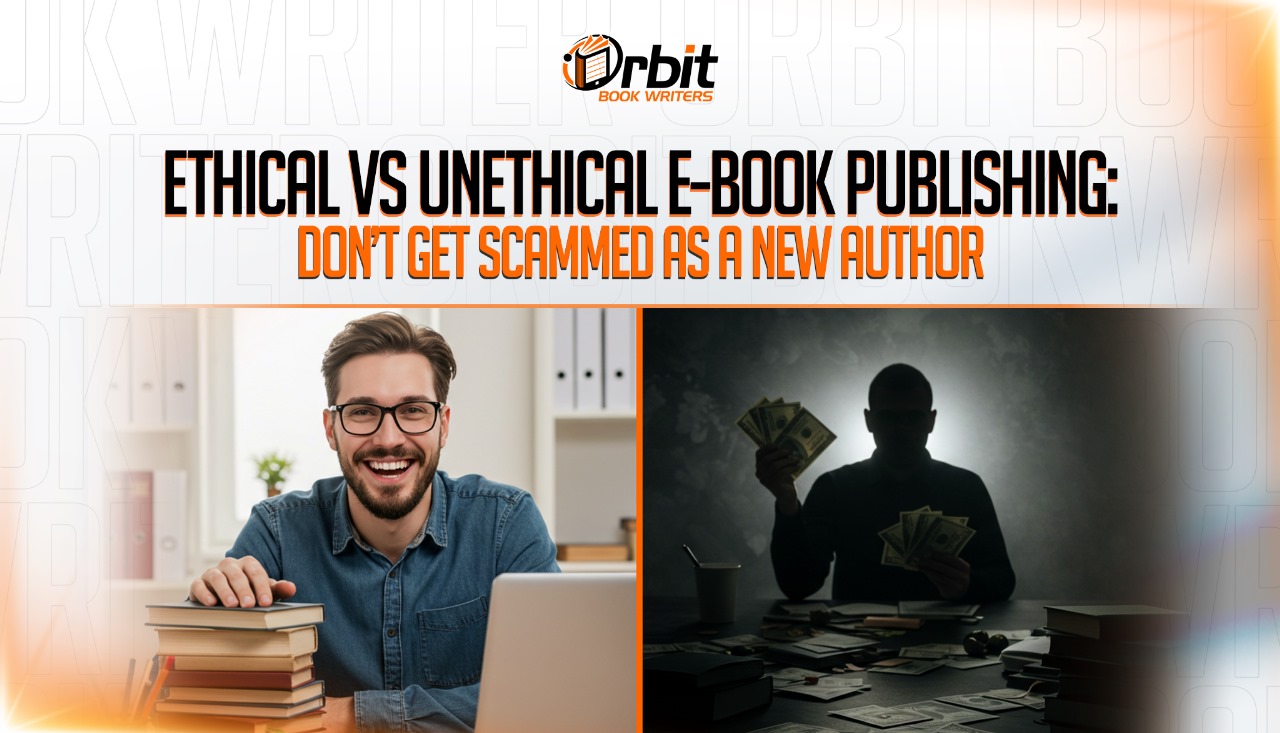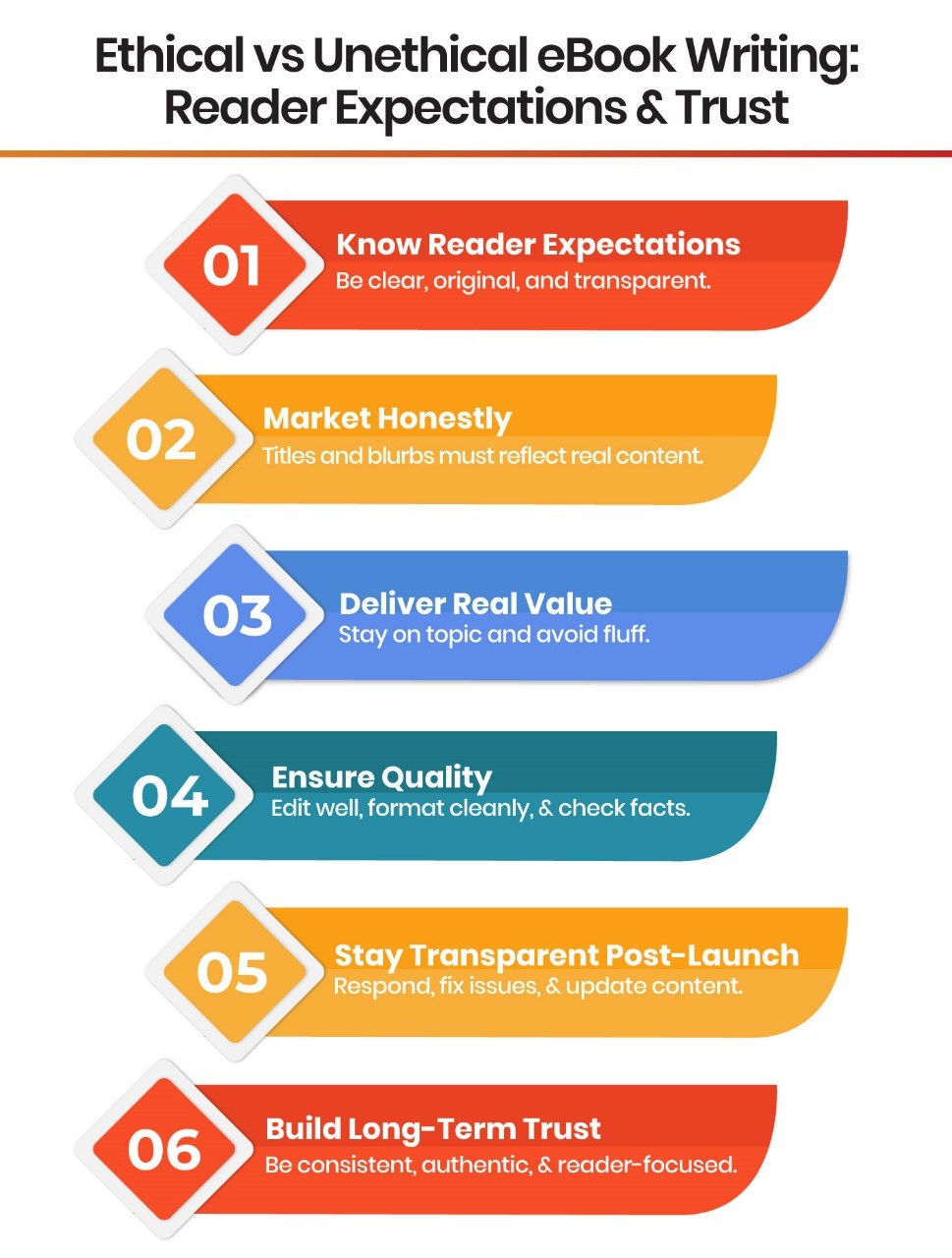Table Of Content
Ethical vs Unethical eBook Writing: What Every Author Should Know

In a world where anyone can publish with a click, one question often goes unasked: Are you writing ethically? With content flooding the digital space, the lines between originality and shortcuts, honesty and hype, can easily blur. That’s where the real challenge and responsibility begin.
Ethical vs Unethical eBook Writing isn’t just a legal concern; it’s a matter of integrity, reader trust, and your long-term success as an author.
Whether you’re just starting or have a few titles under your belt, understanding the ethical side of writing can be the difference between building a loyal audience and damaging your reputation.
In this blog, we’ll break down the gray areas, expose common pitfalls, and share practical tips to help you navigate the digital publishing world with confidence and clarity.
Key Takeaways
- Understanding the ethical considerations in eBook creation.
- Best practices for maintaining integrity in your eBook.
- How to respect your readers through ethical eBook writing.
- Guidelines for navigating the digital publishing landscape.
- Tips for avoiding common ethical pitfalls in eBook creation.
Understanding the Foundations of Ethical vs Unethical eBook Writing

In the digital publishing world, authors must grasp the ethics of eBook writing. The ease of publishing online has raised ethical standards. This is vital for maintaining the integrity of the industry and ensuring quality content for readers.
Defining Ethics in Digital Publishing
Ethics in digital publishing are about moral principles guiding authors, publishers, and readers. Writing eBooks responsibly means following these principles. This includes honesty, fairness, and respect for intellectual property. Ethics are key to the industry’s integrity and quality content for readers.
Issues like copyright infringement and plagiarism fall under digital publishing ethics.
Authors must be mindful of these to avoid unethical eBook practices. Such practices can harm their reputation and readers.
The Impact of Ethical Choices on Your Author Brand
Ethical choices significantly affect an author’s brand and reputation. Ethical guidelines for eBook authors are about more than legal compliance.
They’re about building trust with readers. Ethical standards show an author’s commitment to quality and integrity, fostering loyalty and a strong brand.
On the other hand, unethical eBook practices can lead to severe consequences. These include loss of credibility, legal issues, and a damaged reputation. Authors focusing on ethics are more likely to succeed and gain a loyal readership.
Legal vs Moral Considerations in eBook Creation
In eBook creation, authors face legal and moral challenges. Legal aspects involve following laws and regulations.
Moral considerations are about ethical principles, even if not legally required.
Writing eBooks responsibly means balancing these to ensure legal compliance and ethical soundness.
Understanding ethical vs unethical eBook writing helps authors make informed decisions. This enhances credibility and contributes to a trustworthy digital publishing ecosystem.
Common Unethical Practices in eBook Writing to Avoid
EBook authors must avoid several unethical practices to maintain integrity. The digital publishing world is constantly changing.
It’s more important than ever to follow ethical standards. Unethical actions can damage an author’s reputation and erode trust with readers.
Plagiarism and Content Theft
Plagiarism is a major issue in eBook writing, involving the use of someone else’s work without permission.
Content theft can take many forms, from copying directly to paraphrasing without credit. Authors must ensure their work is original and cite any referenced material correctly.
Tip: To prevent plagiarism, understanding what constitutes original content is critical. Properly quoting or paraphrasing others’ work is essential.
Using plagiarism detection tools can also verify content originality.
Misleading Marketing and False Promises
They can trick readers into buying eBooks under pretenses. This includes exaggerating benefits, making unsubstantiated claims, or using deceptive titles and covers.
Key note: Transparency is vital; marketing should accurately reflect the eBook’s content and value.
Authors must be truthful in their marketing, avoiding any misleading or deceptive practices. This builds a loyal reader base and preserves professional integrity.
Self-publishing traps for Authors
Many writers eager to share their work fall into common self publishing traps for authors, risking both time and money.
- These pitfalls often include overpriced vanity presses, poor editing, and ineffective marketing strategies.
- Without thorough research, authors may end up with low-quality books and minimal sales.
- One major trap is assuming publishing alone guarantees success.
Note: Avoiding these self-publishing traps for authors starts with education and careful planning.
Copyright Violations and Improper Attribution
They occur when authors use material without permission or proper credit. This includes images, text, or media protected by law.
Proper attribution involves crediting the original creator and, if necessary, obtaining permissions.
To avoid copyright issues, authors need to understand fair use and when to seek permissions. Properly attributing sources prevents legal problems and respects other creators’ work.
Low-Quality Content and “Stuffing” Techniques
- Creating low-quality content or using “stuffing” techniques, like keyword stuffing, can harm an eBook’s credibility.
- Keyword stuffing involves overusing keywords to improve search engine rankings, often at the expense of content quality.
- Authors should aim for high-quality, engaging content that adds value to readers.
- This means balancing SEO needs with clear, concise, and structured writing.

How to Publish an eBook Ethically: Best Practices for Ethical eBook Creation
Ethical eBook writing is based on
- original research
- proper citation
- Transparency
- Strict quality control
By following these principles, authors can ensure their work is ethically sound and of high quality. This makes their content engaging for readers.
Original Research and Content Development
Conducting original research is crucial for creating unique and valuable content. This involves gathering data from credible sources, analyzing it, and presenting findings.
Authors should aim to contribute new insights, avoiding the mere rehashing of existing information.
For example, a study on the impact of ethics in writing on reader engagement could provide valuable insights for both authors and publishers.
| Research Method | Description | Benefits |
| Surveys | Gathering data through questionnaires | Provides first-hand insights from participants |
| Interviews | In-depth discussions with experts or individuals | Offers a nuanced understanding of topics |
| Case Studies | Detailed analysis of specific instances or examples | Helps in understanding complex issues |
Proper Citation and Attribution Methods
Proper citation is crucial for maintaining academic integrity and avoiding ethical issues of plagiarism.
Authors should familiarize themselves with citation styles (e.g., APA, MLA, Chicago) and apply them consistently. This gives credit to the original authors and enhances the eBook’s credibility.
- Use quotation marks for direct quotes
- Paraphrase information and cite the source
- Reference all sources in a bibliography or reference list
Transparency with Readers
Transparency is essential for building trust with readers. Authors should be clear about their methods, data sources, and any biases.
This transparency helps readers evaluate the information and make informed decisions. For ethical book publishers, transparency is also vital in maintaining their reputation and the integrity of their publications.
Quality Control and Fact-Checking
Rigorous quality control and fact-checking are essential for ensuring content accuracy and reliability. Authors should verify facts, check for consistency, and edit their work carefully.
This process enhances the eBook’s quality, protects the author’s reputation, and maintains reader trust.
- Verify facts and data
- Edit for grammar, punctuation, and style
- Seek peer review when possible
These reflect positively on the authors and ethical book publishers who value integrity and quality in their publications.
Building a Sustainable Author Career Through Ethical Practices
In the digital publishing world, ethics are crucial for an author’s reputation and career. As eBooks become more popular, authors face choices that impact their success and future in the industry.
Ethical eBook writing is vital for building trust, maintaining a strong author brand, and following the law.
Long-term Benefits of Ethical eBook Writing
Opting for ethical eBook writing offers numerous advantages for authors. It fosters a positive author brand, anchored in trust and integrity.
- This is crucial for maintaining a loyal readership.
- Moreover, it minimizes the risk of legal issues stemming from copyright violations and plagiarism.
- Authors who adhere to ethical standards are more likely to see their careers flourish.
- Their dedication to ethics manifests in the quality of their work, their connection with readers, and their adherence to industry norms.
This positions them favorably in the competitive eBook market, paving the way for long-term success.
- The use of AI tools, repurposing content, and collaboration can be complex.
- AI can enhance productivity and creativity, but raises questions about authorship and originality.
- Repurposing content must be done with caution to avoid copyright infringement and to prevent misleading readers.
- To navigate these gray areas, authors should be transparent about their AI usage and indicate when content is repurposed or collaborative.
- Establishing clear guidelines and best practices is essential for maintaining ethics and trust with readers.
Responding to Ethical Dilemmas in Publishing
Authors may encounter ethical challenges during their publishing journey.
These could include:
- plagiarism accusations
- copyright law complexities
- marketing blunders.
Note: Authors should be prepared to address ethical issues promptly and openly. Seeking professional advice when necessary is also vital.
| Practice | Ethical Outcome | Unethical Outcome |
| Content Originality | Enhanced credibility and reader trust | Risk of plagiarism accusations and legal issues |
| Marketing Transparency | Built on trust, leading to loyal readership | Potential for misleading readers, damaging reputation |
| Collaboration and AI Use | Clear disclosure fosters trust and credibility | Lack of transparency can lead to accusations of dishonesty |
Endure Success In Your Digital Realm With Orbit!
The digital publishing landscape is ever-evolving. For authors aiming for a lasting career, embracing ethical eBook writing practices is essential.
Recognizing the distinction between ethical and unethical eBook writing enables authors to make choices that shape their reputation and brand. Practices like plagiarism and misleading marketing can severely harm an author’s credibility and prospects. Conversely, ethical eBook creation fosters a strong bond with readers, based on trust and openness.
Authors who uphold ethical guidelines, such as conducting original research and ensuring proper citations, maintain high standards. As the publishing industry grapples with AI tools, repurposing, and collaboration, adhering to ebook writing ethics becomes more critical than ever.
Embracing ethical eBook creation is a fundamental step towards establishing a respected author brand. So, for achieving enduring success in the digital publishing realm, get in touch with Orbit Book Writers. Contact us at (646) 222-3596 or email us at info@orbitbookwriters.com
FAQ
Q: What is considered plagiarism in eBook writing?
A: In eBook writing, plagiarism involves using someone else’s work, ideas, or words without proper credit. This includes copying text, using research without citation, or not acknowledging contributors. It’s about presenting others’ work as your own.
Q: How can I ensure I’m not violating copyright laws when writing an eBook?
A: To avoid copyright issues, use original content or cite third-party material properly. Obtain permissions for copyrighted works, like images or quotes. Always attribute any material used under fair use correctly.
Q: What are some common examples of misleading marketing in eBook publishing?
A: Misleading marketing includes making false claims about the book’s content or benefits. It also involves deceptive pricing, fake reviews, and misleading titles or cover designs. These tactics do not accurately represent the eBook’s content.
Q: How can I maintain transparency with my readers when writing an eBook?
A: Transparency means being honest about the eBook’s content and purpose. Disclose any affiliations or sponsorships. Be upfront about the eBook’s limitations and provide accurate information.
Q: Can using AI tools in eBook creation be considered unethical?
A: Using AI tools can be ethical if done transparently and responsibly. Authors should disclose AI’s role in their work. This ensures the final product is original and properly attributed.

At Orbit Book Writing, we are passionate about turning your ideas into captivating stories that resonate with readers. With a dedicated team of experienced writers, editors, and designers, we specialize in providing tailored solutions to meet your unique publishing needs.